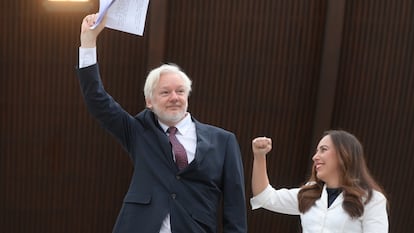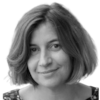Julian Assange’s uncertain future in a world he no longer recognizes: ‘It’s not simply the spooky sound of electric cars’
The founder of WikiLeaks has not revealed his plans and people close to him say that he needs time to recover after spending 12 years in isolation


Julian Assange — the man who uncovered some of the darkest secrets of the most powerful governments on the planet — is having a hard time understanding and navigating the “big wide world” he has returned to after spending more than a decade locked away. For seven years, he lived in the Ecuadorian embassy in London and for another five years, he was detained in a high-security British prison.
“Isolation has taken its toll,” the founder of WikiLeaks admitted on Tuesday before the Council of Europe in Strasbourg, in his first public address since he was released at the end of June after reaching a plea agreement with the United States, the country that had wanted to prosecute him for revealing classified military information on WikiLeaks.
Assange has to learn all over again how to be a father — he had two children during his captivity — and a husband, while dealing with the scars left by his confinement, of which he says he is still unable to give details. Back in the world, he has been surprised by how much has changed. “It’s not simply the spooky sound of electric cars that are very spooky. But it is also the change in the society,” said Assange, arguing that freedom of expression has taken a step backward since he since got his life back.
“I see more impunity, more secrecy, more retaliation for telling the truth and more self-censorship,” he told the Council of Europe’s Committee on Legal Affairs and Human Rights. “Where we once released important war crimes videos that stirred public debate, now every day, there are live-streamed horrors from the wars in Ukraine and the war in Gaza. Hundreds of journalists have been killed in Ukraine and Gaza combined. The impunity continues to mount… and it is unclear what we can do about it,” he added with concern.
In his address, Assange made it clear that he continues to believe in the values that led him to publish hundreds of thousands of classified documents, despite the high toll it took on his life: as well as being detained for years, he faced 175 years in prison for violating the U.S. Espionage Act. “When I founded WikiLeaks, it was driven by a simple dream: to educate people about how the world works so that, through understanding, we might bring about something better,” he told the Council of Europe.
But that dream turned into a nightmare, with Assange spending years in isolation in a small cell. It’s an experience that he said he is yet to recover from. As a result, Assange and the people around him have refused to answer whether the former hacker will continue to do what he does best: reveal what the powerful want to hide.
“Julian has made a great exception by coming here,” said his wife, the lawyer Stella Assange, at a press conference after her husband’s hearing, who by then had already hidden from the cameras again. “But I think everyone can tell that he is exhausted, that he is still very much in the process of recovering. And at the moment, the only concrete plan in the foreseeable future is that he will continue his recovery.”
Assange’s fragile state was evident in the hour-long session in which he testified and answered questions from the Parliamentary Assembly of the Council of Europe (PACE). On Wednesday, PACE will debate a resolution on Assange’s case and its “chilling effect on human rights” and freedom of expression. The old Assange — who was considered arrogant and verbose — has given way to a man who still speaks with a firm voice, but takes his time to respond, admits to being deeply exhausted and even perplexed by the most trivial things in his new life.
“As for my adaptation to the big wide world, outside of the embassy siege and maximum security prison, it sure takes some adjustment,” admitted the Australian, who repeated that he “lost 14 years” since his ordeal began in 2010. Two years later, he sought refuge in the Ecuadorian embassy, from where he was taken to prison in 2019. “Isolation has taken its toll. Which I am trying to unwind. And expressing myself in this setting is a challenge,” he said.
Returning to public life is not the only challenge, being part of a family again is also difficult, he admitted. “Becoming a father again to children who have grown up without me. Becoming a husband again. Even dealing with a mother-in-law. These, trying family issues,” he said, which sparked laughter from the audience, which grew louder, when — after looking mischievously at his wife — he rushed to say his mother-in-law was “a very lovely woman.” With a similar knowing smile, Stella Assange briefly turned off the microphone. “He needs time,” Stella Assange — a Swedish-Spanish lawyer — insisted, more seriously, on several occasions.
Asked if his future lies with WikiLeaks, both Assange and his wife, as well as the platform’s current editor-in-chief, Kristinn Hrafnsson, refused to give a clear answer. “It’s only been a few weeks since Julian was released from prison in shackles, let’s give him some time,” said Hrafnsson, although he hinted that he would not be surprised if Assange returned to action sooner rather than later. Assange “is working hard on his recovery, that is his first objective,” he said. “But he is as committed as ever to the basic principles that he’s always abided by — transparency, justice, quality journalism.”
Sign up for our weekly newsletter to get more English-language news coverage from EL PAÍS USA Edition
Tu suscripción se está usando en otro dispositivo
¿Quieres añadir otro usuario a tu suscripción?
Si continúas leyendo en este dispositivo, no se podrá leer en el otro.
FlechaTu suscripción se está usando en otro dispositivo y solo puedes acceder a EL PAÍS desde un dispositivo a la vez.
Si quieres compartir tu cuenta, cambia tu suscripción a la modalidad Premium, así podrás añadir otro usuario. Cada uno accederá con su propia cuenta de email, lo que os permitirá personalizar vuestra experiencia en EL PAÍS.
¿Tienes una suscripción de empresa? Accede aquí para contratar más cuentas.
En el caso de no saber quién está usando tu cuenta, te recomendamos cambiar tu contraseña aquí.
Si decides continuar compartiendo tu cuenta, este mensaje se mostrará en tu dispositivo y en el de la otra persona que está usando tu cuenta de forma indefinida, afectando a tu experiencia de lectura. Puedes consultar aquí los términos y condiciones de la suscripción digital.








































